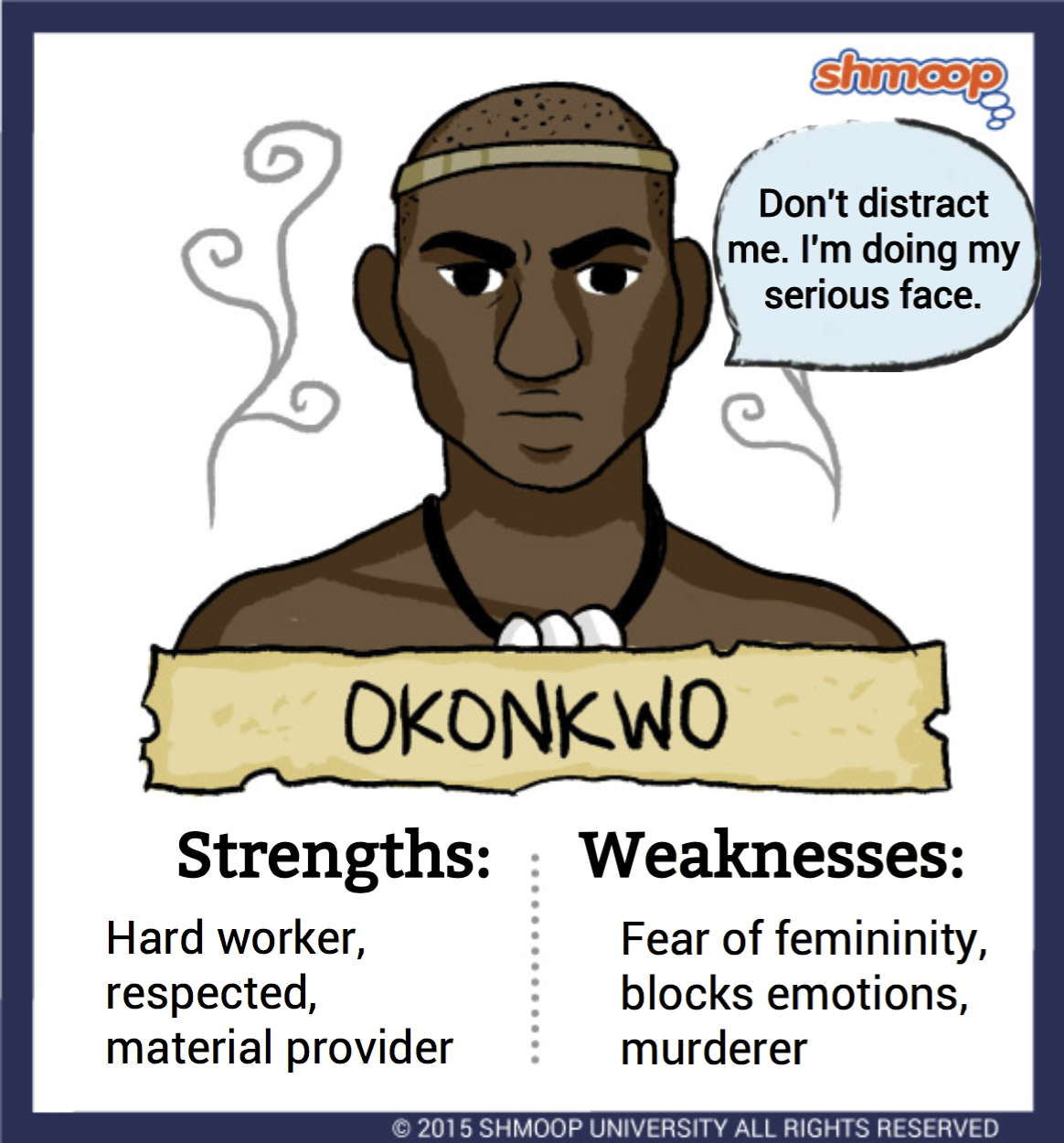Character Analysis

(Click the character infographic to download.)
Okonkwo is a self-made, well-respected member of the Umuofia clan. Though outwardly stern and powerful, much of his life is dictated by internal fear. His greatest, overwhelming worry is that he will become like his father – lazy, unable to support his family, and cowardly. Okonkwo considers many of his father’s characteristics to be feminine. Much of Okonkwo’s behavior results from a reactionary desire to be completely unlike his father. This means that Okonkwo attempts to work hard, provide for his family materially, be brave, and be masculine in every possible way. As a result, Okonkwo’s becomes successful in many ways – he becomes very wealthy, holds a high-ranked position in the community, has three wives, and is known for his skill as a wrestler and warrior. But he also tends toward emotions that are extreme, and his fear motivates him to take actions which are often unnecessary and ultimately destructive. His fear of being feminine leads him to assist in the murder of Ikemefuna whom he loved, to beat his wives, be emotionally distant from his children, and to disown his oldest son.
As an uncompromising man’s man, Okonkwo’s relationship towards his family is one of complete dictatorship. His three wives are there to serve him his food and raise his children. By seeing them as his subjects, Okonkwo can justify his brutal behavior against them. He can beat his wives without guilt. He can threaten Ekwefi with a gun when she talks back. He can rebuke Nwoye for listening to old wives’ tales. This sense of ownership is exemplified when Okonkwo takes Ikemefuna’s life. Though he does have qualms about killing Ikemefuna, they are not qualms about whether or not he has the right to do it. Okonkwo feels complete ownership over his family.
There is, however, the problem of love and intimacy. Okonkwo rarely shows these aspects of himself since he considers emotion soft and feminine – but the emotions are there nonetheless. The fact that he lies to Ikemefuna to protect the boy from fear and later feels guilty about killing him are proof of that Okonkwo isn’t devoid of positive human emotions. But, whenever there is a clash between showing true emotion and maintaining the show of his strength, Okonkwo will always go with the latter.
This doesn't mean that Okonkwo never admits he is wrong; more than anything, Okonkwo tries to follow the laws of the clan. Whenever he breaks them – either deliberately through a loss of temper or inadvertently as in shooting the boy – he never questions the punishments brought upon him. Okonkwo abides by his punishment whether or not he thinks they are fair. This is one way of maintaining his honor and reputation. He reads the laws literally, unlike his father who bent the rules and tried to circumvent certain aspects of the law.
Thus we come to one of the central conflicts in the novel: the divide between Okonkwo’s personal pride and the actions forced on him by the external social laws of the Umuofia. His final act of suicide is the ultimate demonstration of things falling apart because it is the first and only time that Okonkwo purposefully and calculatedly breaks the clan laws. As a character, Okonkwo remains pretty consistent throughout the book. We see no sudden changes in behavior or mindset; in fact, that may be Okonkwo’s problem – his inability to adapt or compromise his ethics to changing situations that call for more tolerance or compassion. Okonkwo, whose sense of pride and dignity continues until the end, chooses to live and die on his own terms rather than submit to the white man. For Okonkwo, giving in would be against so much of what he has stood for – courage, tradition, and manliness.